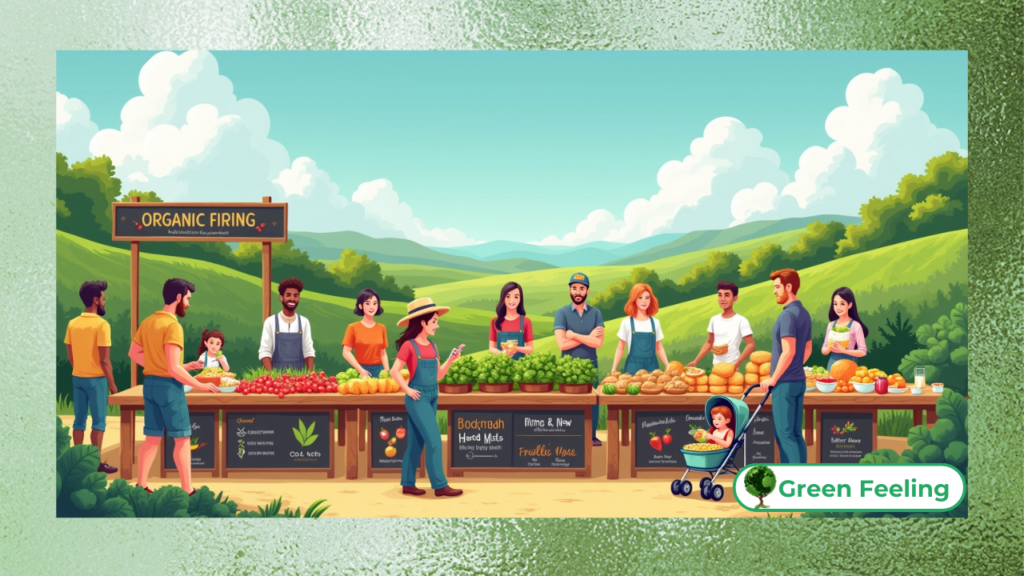Organic Markets: Connecting Producers and Conscious Consumers
Organic markets have emerged as vital spaces where farmers and consumers come together to promote sustainable agriculture and healthy living.

These markets are more than just places to buy fresh produce; they are hubs of community interaction, education, and environmental stewardship.
By connecting organic producers with conscious consumers, these markets play a crucial role in supporting local economies, reducing the carbon footprint of food production, and fostering a deeper understanding of where our food comes from.
This article explores the significance of organic markets, their benefits, and how they contribute to a more sustainable food system.
- Organic markets bridge the gap between farmers and consumers.
- They promote sustainability, community engagement, and healthy living.
The Role of Organic Markets in Sustainable Agriculture
Organic markets serve as a platform for farmers who practice sustainable agriculture to showcase their products.
These markets prioritize organic farming methods, which avoid synthetic pesticides and fertilizers, promote soil health, and conserve water.
By providing a direct sales channel, organic markets enable farmers to receive fair compensation for their efforts, reducing their reliance on middlemen.
This direct connection also allows consumers to learn about the farming practices behind their food, fostering transparency and trust.
Additionally, organic markets often encourage crop diversity, as farmers grow a variety of produce to meet consumer demand, which further supports ecological balance.
- Organic markets support sustainable farming practices.
- They provide fair compensation and transparency for farmers.
- Crop diversity is encouraged, promoting ecological balance.
+ Read More: Best Plants for Bathroom
Benefits for Consumers

For consumers, organic markets offer access to fresh, nutritious, and chemical-free produce.
Shopping at these markets allows individuals to make informed choices about their food, supporting their health and well-being.
Additionally, organic markets often feature a diverse range of products, including fruits, vegetables, dairy, and artisanal goods, providing a unique shopping experience.
By purchasing directly from farmers, consumers can also reduce the environmental impact associated with long-distance food transportation.
Furthermore, the seasonal nature of organic markets encourages consumers to eat locally and seasonally, which is not only healthier but also more sustainable.
- Access to fresh, nutritious, and chemical-free produce.
- Reduced environmental impact through local purchasing.
- Encouragement of seasonal and local eating habits.
Community Building and Education
Organic markets are more than just transactional spaces; they are community hubs that foster connections and education.
Many markets host workshops, cooking demonstrations, and talks on sustainable living, empowering consumers with knowledge about organic farming and healthy eating.
These events create opportunities for dialogue between producers and consumers, strengthening the bond between them.
Furthermore, organic markets often support local artisans and small businesses, contributing to the vibrancy and resilience of the community.
They also serve as platforms for raising awareness about environmental issues, such as plastic waste and climate change, encouraging consumers to adopt more sustainable lifestyles.
- Workshops and events promote education and engagement.
- Support for local artisans and small businesses enhances community resilience.
- Awareness campaigns address environmental issues.
Read More: How to Implement an Agroforestry System on Small Farms
Challenges Faced by Organic Markets
Despite their many benefits, organic markets face several challenges.
One major issue is the competition from large supermarkets, which often offer lower prices due to economies of scale.
Additionally, the lack of infrastructure and funding can limit the growth and accessibility of organic markets.
Weather conditions and seasonal availability of produce can also affect the consistency of supply.
However, these challenges can be addressed through community support, government initiatives, and innovative solutions such as online marketplaces.
For example, some organic markets have started offering subscription-based models or home delivery services to reach a wider audience.
- Competition from supermarkets and pricing challenges.
- Infrastructure and funding limitations.
- Innovative solutions like online marketplaces and subscriptions.
+ Medicinal Plants in Organic Agriculture: Use and Benefits
Case Studies: Successful Organic Markets Around the World
Organic markets have gained popularity worldwide, with many successful examples to draw inspiration from.
In the United States, the Union Square Green Market in New York City is a renowned organic market that connects urban consumers with local farmers.
It has become a model for other cities, showcasing how organic markets can thrive in urban settings.
In Europe, the Borough Market in London offers a wide range of organic and artisanal products, attracting both locals and tourists. This market is known for its emphasis on quality and sustainability.
In India, the Delhi Organic Farmers’ Market provides a platform for small-scale farmers to sell their produce directly to consumers, promoting organic farming in a region where conventional agriculture dominates.
Other notable examples include the Marché Biologique Raspail in Paris and the Feria Verde in Costa Rica, both of which highlight the global reach and impact of organic markets.
- Union Square Green Market in New York City.
- Borough Market in London.
- Delhi Organic Farmers’ Market in India.
- Marché Biologique Raspail in Paris.
- Feria Verde in Costa Rica.
Future Prospects and Innovations
The future of organic markets looks promising, with growing consumer awareness and demand for sustainable products.
Innovations such as online organic marketplaces and subscription-based models are making organic produce more accessible to a wider audience.
Additionally, partnerships between organic markets and local governments can help address infrastructure challenges and promote sustainable food systems.
For instance, some cities are integrating organic markets into urban planning, creating dedicated spaces for farmers and consumers to connect.
As the organic movement continues to grow, organic markets will play an increasingly important role in shaping the future of food production and consumption.
- Online marketplaces and subscription models enhance accessibility.
- Partnerships with local governments support growth and sustainability.
- Integration of organic markets into urban planning.
+ What Is Urban Greening? Discover the cities of the future
Conclusion
Organic markets are essential spaces that connect organic producers with conscious consumers, fostering sustainable agriculture, community engagement, and environmental stewardship.
By supporting local farmers, providing access to fresh and nutritious produce, and promoting education, these markets contribute to a healthier and more sustainable food system.
Despite the challenges they face, organic markets continue to grow and innovate, offering hope for a future where sustainable practices are at the heart of food production and consumption.
As more people recognize the value of organic markets, their impact will only continue to expand, creating a more resilient and equitable food system for all.
References
GUTHMAN, J. Agrarian Dreams: The Paradox of Organic Farming in California. Berkeley: University of California Press, 2004.
FAO. The Role of Urban and Peri-urban Agriculture in Food Security. Rome: Food and Agriculture Organization, 2014.
LOCAVORE. The Impact of Farmers’ Markets on Local Economies. London: Locavore Publications, 2020.






